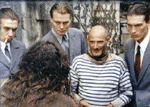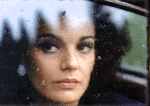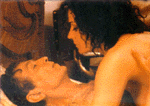
| András Csathó | Lessons in Chinese |

|
Gábor Tompa: Chinese Defence
 Péter György returns after almost 20 years of absence (Emil Győry) 60 KByte |
Dove among the rails. When the train comes and hits the dove that is about to fly - that's when the film starts. With the death of the dove, the death of the innocent dove that the camera kept observing for so long, the film starts, the music comes in. The director tells about this death once again: a fool that sings Marseillaise and marches about in the town with feather-wings attached to his arms, is taught to fly by the Securitate and is thrown from a parachuting tower. The main protagonist arriving into town exchanges a glance with this fool: they have found each other. They look at one another once, then for a second time (one is leaving, the other is entering the building of the Securitate), a parable is heard from the fool's mouth, then they look at each other again, true, the fool having failed to learn to fly is lying on the ground dead, and the other looks at him. The director says everything twice, says everything twice. The town into which the main protagonist arrives after two decades of capture in Siberia lives its own "communist", separated life: this is already Romania, geographically and historically alike. The "not anybodies" speak Romanian, the anybodies Hungarian. The consider this impossible returnee (Does he arrive home? This will be discussed later, or rather this is the only thing to be discussed.) an agent, a spy, an enemy. Because he's so impossible. And because there's something wrong with his identity. He drops into the geographical-historic reality where a Jirí Menzel-kind of life is lead, where people are beyond wondering about surprises of history: the traffic assistant's wife shakes her red gowned bottom to the melody of Marina, the prime secretary is most interested in the fly-trap competition. "Who are you, where are you coming from?" - they ask from the great innocent. He, however, is not interested in anything but where have I came. Not historically, he is not interested in that, he doesn't understand that, what's more, he doesn't even want to understand. That's too complicated, difficult and logic fails to explore it. He is even criticised by the policeman, "You never ask anything". He only wants to come home geographically. The great innocent lets them do anything to him: change his clothes, cut his hair and beard, give him a new name and identity. That is, they give him a past. After all, he can't just walk around town in such clothes and with such a past. That's impossible. Cutting his hair and dressing him up is enough for us to understand: they have created a new man. They add the Securitate's decision presented in Hungarian and Chinese, controlled in Romanian: his official past is read out. Even though we have understood it by now. And then he is told to fuck off in three languages. Only fools, dogs and women have some sympathy, understanding for him. Fools, Wisemen and dumbs. The party secretary-lover turned nun and the state whore. The one who lives her party controlled life and ultimately leaves him on his own. There's no-one here who could be his companion. Or even an alternative in this new world. The (Hungarian) doctor has no sympathy (why then does he quote Áron Tamási's much-quoted sentence? Because he is already a scepticist, that is he doesn't believe that "it is possible to be home in the world"?), the (Hungarian) policeman kicks him out: "I'm fed up with you", the (Romanian) peasant chases him away from his land, all the authorities do is experience on him. Everybody abandons him, or rather: nobody joins him. Finally he finds his home: he returns to the village that is now under water. He swims into the lake, into the church standing in water and utters the last sentence of the film: I'm free. A parable. Presenting the geographical-historical reality happens in the name of realism (frowning, parodistical, but still realism). This world stands outside of the protagonist who is pathos incarnate: as soon as he arrives to the town by train (we still haven't seen him, just his feet), a peasant woman asks for his blessing. He is a saint. He eats soil and has a mission. Two worlds are opposed and we understand that Péter György (by his new name Petre Gheorghiu) wins, conquers, convinces. With the conviction and notoriety of saints he swims into the lake that used to be his home and where a Romanian peasant is fishing now. Against all odds. Against the whole world: he is home now. The film cannot become poetry, the more and more bloody, but still parodistical realism doesn't let that. It cannot be realism, since the main protagonist cannot enter the reality he has returned to. Halfway through. It stands between the two, vaguely, staggering, searching. There's no passage between the two worlds: either-or. Gábor Tompa is just as stubborn and inflexible as his film character. One is either here, on this side, or there. If he's there, we condemn him, if he's here, well...What happens to the hero? Does he get destroyed? (A hero cannot, heroic pathos does not let that happen. What the, does he have a heroic death?) He wants none of the new identity, he has his own past, thank you very much. And since the main protagonist is the only one we are offered to identify with, he must be the example, the one to follow... Péter György's story is a story of success: he cannot be broken morally, he cannot be defeated. I almost used the magic word "survival". The most noble minority phrase. The parable offered by the main protagonist is poetry. He doesn't seek contact with reality, the world he returned to (although there are living figures in it, morally dead and dead). The alternative offered by him (and Gábor Tompa - who identifies with him) does not talk about alternatives in the world where this minority (human value, whatever) has to live. He remains with the commonplace of "survival". How to survive - he never tells us. The film was made in 1998. Transylvanian Hungarians keep spreading all around the world, or strive to survive. This way, or that. This film is about them and for them, if it's a parable. But if it's for them, the solution says nothing more than the commonplaces they must have had enough of by now. Because they have to survive in that world, they have to have some sort of contact with it. For them, this is Chinese. Because it doesn't offer alternatives, only phrases. |
 Voila la liberté! The Artist and his guards (Jean-Pierre Becker) 64 KByte | |
 Irma Maia Morgenstern 43 KByte | |
 Péter György and his new looks (Emil Győry and Maia Morgenstern) 42 KByte | |
 "Hungarian, Romanian or Chinese?" 50 KByte |
